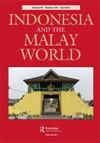Interpreting the Palu’e Legend Pio Pikariwu
IF 0.9
3区 社会学
0 ASIAN STUDIES
引用次数: 0
Abstract
ABSTRACT This article explores the Palu’e legend Pio pikariwu and how the main character Pio is contested by two traditionally rival politico-ceremonial domains on Palu’e island. The stateless clan-structured societies of eastern Indonesia, such as the Palu’e, are not known to have stranger-king myths, the weight of the analysis therefore lies on whether Pio pikariwu fits this category. The relevant themes are compared with the established stranger-king tropes, while basic conceptual tools of comparative Austronesian ethnology, such as that origin establishes precedence, are used to explain the significance of the legend in contemporary society. The legend concurs with several themes of the stranger-king myth, despite that Pio neither becomes a sovereign or has a genealogy. The stranger theme concurs more with a divine kingship related to the South Sulawesi origin histories of founding rulers and a horizontal cultural transfer is plausible due to geographic adjacency and historical connections. A local character projection is also considered. The real-life contestation for Pio involves spiritually potent material heritage and exemplifies how tradition creates new events based on an original event believed to have happened, and that precedence issues extend beyond the domain and its alliances. The demonstrated inherent ambiguity reveals an arrested (divine) stranger-king myth, representing the rejection of kingship.摘要:本文探讨了巴鲁传说中的皮奥皮卡里乌,以及主角皮奥是如何在巴鲁岛上被两个传统上对立的政治礼仪领域所争夺的。印尼东部的无国籍部落结构社会,如巴鲁人,并不知道有陌生的国王神话,因此分析的重点在于皮奥·皮卡里乌是否符合这一类别。相关主题与既定的陌生人国王比喻进行了比较,而比较南岛民族学的基本概念工具,如起源确立了优先地位,则被用来解释传说在当代社会中的意义。这个传说与陌生人国王神话的几个主题一致,尽管皮奥既没有成为君主,也没有家谱。陌生的主题更符合与南苏拉威西起源的开国统治者历史有关的神圣王权,由于地理相邻和历史联系,横向文化转移是合理的。还考虑了局部字符投影。皮奥在现实生活中的竞争涉及精神上强大的物质遗产,并说明了传统如何在被认为已经发生的原始事件的基础上创造新的事件,以及优先权问题超出了领域及其联盟。所展示的内在歧义揭示了一个被捕的(神圣的)陌生人国王神话,代表着对王权的拒绝。
本文章由计算机程序翻译,如有差异,请以英文原文为准。
求助全文
约1分钟内获得全文
求助全文
来源期刊

Indonesia and the Malay World
ASIAN STUDIES-
CiteScore
2.00
自引率
0.00%
发文量
17
期刊介绍:
Indonesia and the Malay World is a peer-reviewed journal that is committed to the publication of scholarship in the arts and humanities on maritime Southeast Asia. It particularly focuses on the study of the languages, literatures, art, archaeology, history, religion, anthropology, performing arts, cinema and tourism of the region. In addition to welcoming individual articles, it also publishes special issues focusing on a particular theme or region. The journal is published three times a year, in March, July, and November.
 求助内容:
求助内容: 应助结果提醒方式:
应助结果提醒方式:


